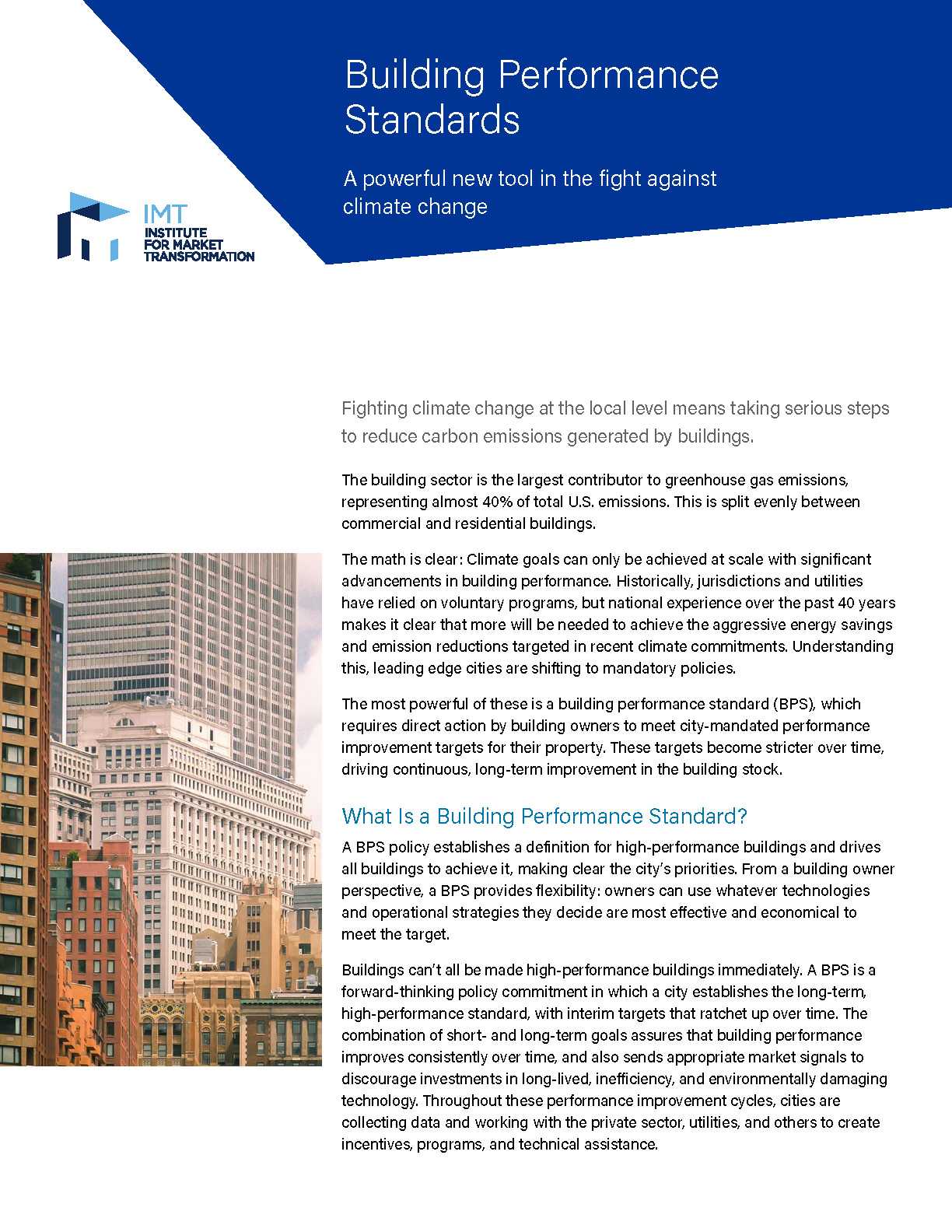New Hub will be a one-stop-shop to help building owners and operators substantially cut District carbon emissions.
FOR IMMEDIATE RELEASE
Contact:
Katie Weeks, 202-525-2883, x306; Katie.weeks@imt.org
Chris Potter, 240-244-7568; chris@imt.org
WASHINGTON, DC (October 30, 2019)—Earlier this year, the District of Columbia became the first U.S. city to pass legislation that requires owners of a broad swath of existing buildings to improve their energy performance to substantially cut the District’s greenhouse gas emissions. To help the District achieve its ambitious climate commitments, create jobs, and grow its economy, the Institute for Market Transformation (IMT), under the leadership of Mayor Muriel Bowser, is pleased to announce that it is developing a new High-Performance Building Hub to provide critical hands-on assistance to the District’s real estate community and building industry professionals affected by the law.
Sponsored by the District’s Department of Energy and Environment (DOEE), the Hub will help District building industry professionals take actions to improve building performance across new and existing buildings to meet the District’s climate and green building goals. IMT is now hiring a Director for the Hub, which will launch in 2020.
“Buildings currently account for about 74 percent of Washington, DC’s carbon emissions. Knowing this, improving how all buildings—new and existing—use energy across the District is critical to achieving significant reductions and making the District the most sustainable city in the country,” said Lotte Schlegel, Executive Director of IMT. “IMT is proud to be leading the development of the Hub as a dynamic go-to resource that will be responsive to the evolving needs of the District’s building professionals as they work to achieve the District’s climate goals.”
“We look forward to working together with the building and real estate community to implement the first-in-the-nation Clean Energy DC Act,” said DOEE Director Tommy Wells. “Given its deep engagement in building performance efforts across the District over many years, IMT is the right partner to be leading this new initiative.”
Driving Climate Action with First-in-the-Nation Policy
The CleanEnergy DC Omnibus Amendment Act of 2018 supports Mayor Bowser’s pledge to make the District carbon neutral and climate resilient by 2050. To do this, the law includes a first-in-the-nation policy mechanism, the building energy performance standard (BEPS), which IMT took a leading role in developing. Under the BEPS, all existing buildings over 50,000 square feet will be required to reach minimum levels of energy efficiency or deliver savings by 2026. The threshold for affected buildings will drop in the following years to include buildings as small as 10,000 square feet.
A building performance standard is one of the most powerful tools cities can use to drive aggressive emissions reductions to reach climate commitments. As more cities consider building performance standards as a new tool in their fight against climate change, IMT recently released a one-page brief that provides a high-level overview of what a building performance standard is and how cities are using them to drive climate action.
Supporting Success by Responding to Community Needs
In anticipation of the implementation of BEPS requirements, IMT in collaboration with ARUP, the Building Energy Exchange, New Buildings Institute, and Steven Winter Associates, completed a needs assessment of the specific training, capacity buildings, support, and technical assistance needs of the District’s building owners and the consultants they rely on; such as architects, contractors, facility managers, property managers, and real estate brokers. The Hub will also serve as a trusted translator between building industry professionals and related District entities and support systems including the District of Columbia Sustainable Energy Utility, the DC Green Bank, the District Department of Consumer and Regulatory Affairs, and other related branches within DOEE.
“After its residents, buildings are the District’s most valuable asset. The Hub will work to empower professionals to design, build, own and operate better buildings that are more resilient, efficient, healthy, and climate-friendly—thus enhancing their value, growing profits, creating jobs across all skill levels, and helping the District to achieve its climate commitments,” said Cliff Majersik, IMT’s Director of Market Transformation.
IMT is working closely with DOEE and other partner organizations to provide more updates, information, and resources as the Hub is developed. People interested in receiving periodic updates on the development of the Hub can sign up at www.imt.org/Hub.
###
About IMT
The Institute for Market Transformation (IMT) is a national 501(c)(3) nonprofit organization that catalyzes widespread and sustained demand for energy-efficient buildings. Founded in 1996 and based in Washington, D.C., IMT leverages its expertise at the intersection of real estate and public policy to make buildings more productive, affordable, valuable, and resilient.
A trusted, non-partisan leader, IMT focuses on innovative and pragmatic solutions that fuel greater investment in energy-efficient buildings to meet local market priorities. IMT offers hands-on technical assistance and market research, alongside expertise in policy and program development and deployment and promotion of best practices and knowledge exchange. Its efforts lead to important policy outcomes, widespread changes in real estate practices, and lasting market demand for energy efficiency—resulting in greater benefits for all people, the economy, and the environment.
Visit us at www.imt.org and follow us on Twitter @IMT_speaks.
